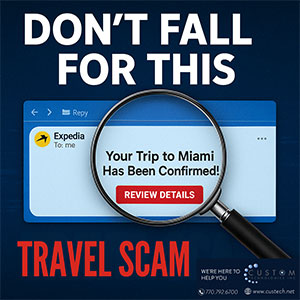 Planning a trip this summer?
Planning a trip this summer?
If a flight confirmation or hotel email hits your inbox, think twice before clicking.
Cybercriminals are ramping up phishing scams that mimic real travel confirmations from trusted brands like Delta, Expedia, Marriott, and Hertz. These emails look legit—and that’s exactly what makes them so dangerous. For business owners and teams that travel frequently, especially in the Metro Atlanta area, this scam can do more than ruin a vacation. It can compromise your business bank account, expose sensitive data, and infect your network.
Here’s how it works—and what to watch out for.
🔍 How the Travel Phishing Scam Works
Step 1: A Fake Booking Confirmation Lands In Your Inbox
It looks like it’s from a real company—logos, formatting, even customer service numbers all check out. Subject lines are crafted to cause panic or urgency:
- “Your Trip to Miami Has Been Confirmed!”
- “Action Required: Confirm Your Hotel Stay”
- “Your Flight Itinerary Has Changed – Click Here”
- “Final Step: Complete Your Rental Car Reservation”
Step 2: You Click the Link and Land on a Fake Website
These fake sites ask you to log in, update your payment info, or download your itinerary—but everything you enter goes straight to the cybercriminals.
Step 3: They Steal Your Info—or Worse
- Credentials give hackers access to your travel, rewards, or even financial accounts.
- Credit card info? Gone.
- Some links carry malware that can infect your device—and spread through your entire business network.
🧠 Why This Scam Works So Well
- It Looks Legit – Most people won’t spot the difference.
- It Creates Panic – “Urgent reservation issues” make you click fast.
- People Are Distracted – If you’re booking travel, you’re probably multi-tasking.
- It Targets Businesses Too – If your company has one person handling all travel, they're a high-value target.
⚠️ Business Risk: Bigger Than a Missed Flight
For Metro Atlanta businesses where employees frequently travel, this scam is a serious threat. Just one click from a travel coordinator, executive assistant, or office manager could:
- Expose your company credit card to fraud
- Compromise corporate travel accounts
- Introduce malware into your network
- Put your clients’ data at risk
✅ How to Protect Your Business
- Go Direct, Not Through E-mail
Always confirm travel info by going straight to the official airline or hotel website. Never click links in unsolicited or unexpected e-mails. - Double-Check the Sender Address
Look for slight misspellings like “@deltacom.com” instead of “@delta.com.” - Train Your Team
Make sure staff who manage travel bookings know how to recognize and report phishing attempts. - Enable Multifactor Authentication (MFA)
If a hacker steals your credentials, MFA can stop them from logging in. - Strengthen Your E-mail Security
Use tools that block malicious links, filter suspicious messages, and alert your IT team.
🛡️ Don’t Let a Fake Travel E-mail Wreck Your Business
Cybercriminals know the perfect time to strike—and travel season is their playground. Whether your team travels for work or you manage corporate bookings, this scam is a growing threat to Metro Atlanta businesses.
Let’s make sure your company is protected.
Start with a FREE Cybersecurity Assessment from Custom Technologies, Inc. We’ll uncover your vulnerabilities, secure your systems, and help your employees stay scam-savvy.
👉 Click here to schedule your FREE Cybersecurity Assessment today!



